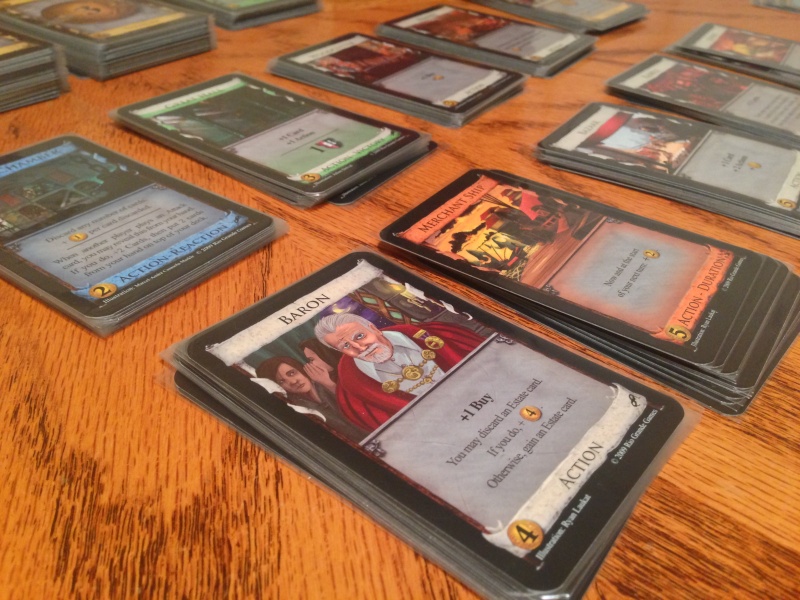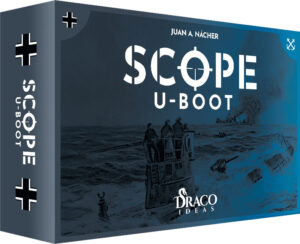 I’m not a person who constantly tells people that they MUST see a movie. Especially nowadays with streaming services releasing bad content at times, but there are a few movies that I have found good to pass along to others. One of those is Greyhound on Apple TV+ which is about an U.S. Navy commander leading an Allied convoy to England and making his first Atlantic Crossing while being hunted and attacked by a German submarine wolf pack. I don’t want to give away any spoilers but the movie was shockingly great with an excellent amount of suspense and action.
I’m not a person who constantly tells people that they MUST see a movie. Especially nowadays with streaming services releasing bad content at times, but there are a few movies that I have found good to pass along to others. One of those is Greyhound on Apple TV+ which is about an U.S. Navy commander leading an Allied convoy to England and making his first Atlantic Crossing while being hunted and attacked by a German submarine wolf pack. I don’t want to give away any spoilers but the movie was shockingly great with an excellent amount of suspense and action.
This brings us to today’s review, Scope U-boot from Draco Ideas. This 2-player hidden movement, asymmetrical game pits an Allied convoy against a German wolf pack, each trying to sink the opponent’s vessels and claim victory.
Game Overview:
Scope U-boot has basic and advanced rules. This review will highlight the basic rules and the Lone Wolf scenario. Game set-up is straightforward and fast. Players shuffle and place a 5 x 5 grid of sea cards (the size of the grid may vary depending on other scenarios). The German player will have one submarine card and two torpedo tokens and the Allied player will receive one direction token, plus ship cards representing two freighters and one destroyer.
The German player will replace one of the five sea cards in front of them (German deployment zone) with their submarine card secretly and the Allied player will place their three ships on the first two rows (Allied deployment zone). The German player is the first player.
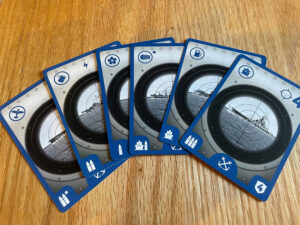
The game starts in the Action Phase with the German player choosing one of the following actions on their turn:
- Submarine movement: player selects a 2 x 2 grid of sea cards and may move their submarine and the other cards, or bluff and move a 2 x 2 grid that does not contain their submarine.
- Torpedo Launch: the German player reveals their submarine card by showing the Allied player its location on the grid, then places it face down, and places a torpedo token on that card in any direction (diagonal or orthogonal).
The Allied player also chooses one of the following actions on their turn:
Fast or Slow Ship Movement: The Allied player also gets to either move their destroyer (a fast ship) or one of their freighters (a slow ship). The destroyer can move one space in any direction (diagonal or orthogonal) and reveals the sea card it moved onto. The freighter has a direction token on it showing where it will move next turn at the start of the next action phase.
After this comes the torpedo phase, where the torpedo will move to the next sea card, except on the turn it was actually launched. If a torpedo enters a card with an Allied ship it sinks or damages it (the destroyer needs two hits to die). If the destroyer moves onto a sea card and it’s a submarine, then it’s destroyed by depth charges.
The game ends when either player reaches 2 points (point totals will vary by scenario) by either sinking Allied ships, destroying submarines or when any freighters move off the sea grid (move off the German deployment zone). The turn which this happens is played in full and the player with the most points wins.
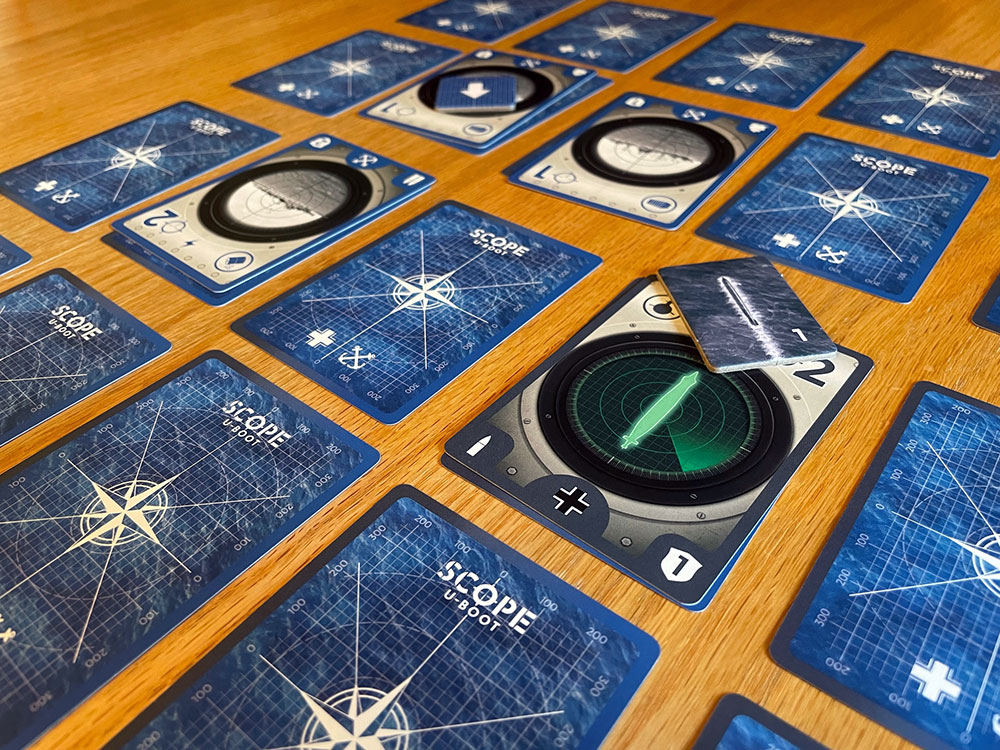
Game Experience:
The game is on the lighter side but what’s surprising is how engaging it is. From the start, each player’s eyes are glued to the game area. The Allied player will be trying to constantly figure out where the German submarines are and where best to move their destroyers to sink them, all the while plotting a safe course for their freighters. The German player will be trying to determine the best place and time to launch their torpedoes, but also wants to sneak away from the Allied destroyer(s). Both players only have one action per turn, so both will try to optimize their turns to avoid giving the other player any advantage.
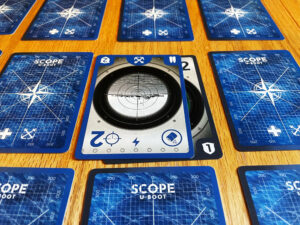
One key and fun Scope U-boot mechanic is the bluff German submarine move. If done well and at the right time, it could have the Allied player send their destroyers on a wild goose chase and leave their freighter(s) vulnerable. But if overplayed or not timed well, the Allied player may see right through the bluff and then the German player has simply wasted vital turns. In any case, the mechanic keeps both players guessing what the other will do and again offers the chance for success tempered by a risk of failure.
The basic rules for Scope U-boot listed above is the best way to learn to play. But once players master the basic rules, they can add advanced rules for more variety and mix and match what they do and don’t want to include. The advanced rules include adding different ships and even aircraft to the fleets by swapping out the starting ships. They also add new game mechanic variants like slow marine movement, and surface combat. The slow submarine movement slows how the submarine moves but also how the destroyers interact with the submarine quadrant. Surface combat allows ships and submarines to use cannons instead of only depth charges or torpedoes and resolves with a card system to determine whether the shots hit or miss. The advanced rules add some complexity but without bogging the game down or making the gameplay too heavy.
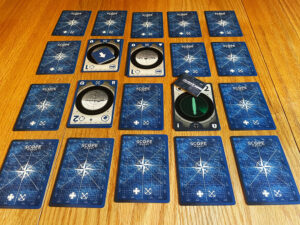
I noted above that Scope U-boot play is light, but while overall, the rulebook is fairly clear, at times information repeats or isn’t crystal clear. The torpedo launch section awkwardly repeats information making you re-read but just know that you cannot launch a torpedo on consecutive turns. The other section that can be hard to parse comes at the end of the rule on slow ship movement, outlining moving into a sea card with a torpedo. I reread that section multiple times before it finally made sense. Basically, a slow ship can enter same sea card as a torpedo if the front of torpedo is not pointed at the ship. If the pointy end is aimed at the ship, the ship is hit, but if not they share the space without any damage taken. The rulebook is in Spanish and English and I think overall it’s clear but there are a few places where some of the rules might be suffering from a confusing translation.
The last thing I had an issue with Scope U-boot was the end-game scoring. For the most part, it’s straightforward and makes sense. If the German or Allied player reaches the target victory points for the scenario, then all actions for that turn are completed and the player with the highest total wins. But, if there is a torpedo left in play that a ship cannot escape in the following turns, this ship is considered sunk and scores points. I was not a fan of this rule which favored the German player when using the basic rules. This could be some way to offset the rule that says a freighter scores double if it manages to sail off the play area and the fact that ties go to the Allies, but it just seemed silly to me.
Final Thoughts:
Scope U-boot is a light game that is fairly easy to learn but it should surprise most gamers that it’s very engaging from the start. I loved the bluff move for the German submarine and this mechanic really plays well with the hidden movement aspect of Scope U-boot. The advanced rules not only make the game a bit more challenging but also turns up the variety and replay value by allowing players to mix and match new rules, as well as incorporating new ships and even aircraft into the fleets.
Now what’s holding back Scope U-boot from scoring higher is a rulebook that could use some tweaking in specific sections and could be clearer and more concise with the information being conveyed. Also, the end-game scoring that allows players to score torpedo hits with ships that would have escaped if the game had continued just seemed silly to me.
Final Score: 4 Stars – A light hidden-movement game that is surprisingly engaging and also includes rules that add some complexity and great variety.
 Hits:
Hits:
• Light game play but very engaging
• Bluff submarine movement
• Advance rules add variety
Misses:
• Some rules seem lost in translation
• End game scoring







